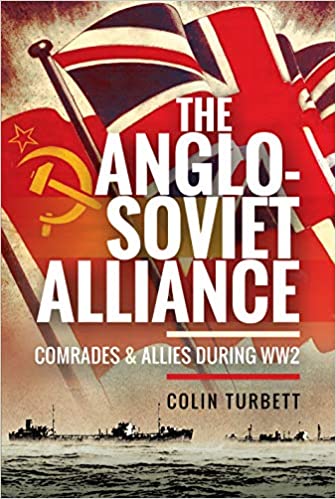Reviewed by CDR Jeffrey Holdsworth, USN
Competition occurs within the context of international relationships, and careful examination of how those relationships form and exert influence at all levels of society is valuable to serious foreign policy and national security professionals. In his third published book, The Anglo-Soviet Alliance: Comrades & Allies During WW2, career British social worker and Soviet historian Colin Turbett explores relationships amidst ideological competition before, during, and following conflict through detailed vignettes.
Turbett presents a successful and balanced examination of the relationships influencing the British and the Soviets during the Second World War. He focuses on the perspectives of ordinary citizens and select prominent figures within contemporary British society, his research revealing details that convey a rich and contextual experience. By emphasizing the sympathies between two populations with starkly different perspectives, he examines the motivations for friendship, commitments, and alliance between the British and the Soviets. By illuminating the tensions operating within British society, he deftly draws a line between parallel forces in political and societal circles and shows how and where they overlapped in meaningful ways. At the heart of these tensions are competing ideologies and the shared vital interests which held the alliance fast.
Turbett thoroughly covers several significant factors that determined the nature of the relationship between the Soviet Union and Great Britain, providing important contextual details exerting influence during the years following the First World War and the sweeping changes affecting the two societies. In so doing, he develops an appreciation for both the sympathies and the tensions between the nascent communist and the established parliamentary systems before exploring the alliance itself. He continues to highlight significant aspects of the alliance in the following chapters exploring unity of action and military cooperation, as exhibited by the case of Arctic convoys. True to the connections between the front lines and societies at large, He opens a window into how the British populace engaged with the concepts of socialism and fascism, both at home and on the front lines across various theaters of war. Finally, he examines the reasons why such a close alliance was followed by the antagonism of the Cold War.
Turbett’s adept and patient examination of the relationship between two militaries, two bodies-politic, and two societies exhibits a deep appreciation for the inherent complexity of such an alliance. A casual reader may at first feel distracted by his consistent inclusion of references to other sections and chapters within this book as he carefully constructs the rich context surrounding the alliance, but the complexity and nuance of the subject is well-framed through his deft employment of this technique. His inclusion of selected quotations from leaders and recognized experts further frames the prevailing conditions and factors. While some of the detailed accounts of key activists within the social and political movements in Great Britain may be more suited to historians of the period, they also illuminate crucial factors for today’s national security professionals. These perspectives are particularly poignant when one takes into consideration the significant technological advances that have accompanied globalization, forging deeper and more personal connections between people across both the globe and the ideological spectrum. I am quite satisfied to have added Turbett’s book to my professional bookshelf and recommend it without hesitation to my colleagues and peers in the Joint Forces and national security communities.
CDR Jeffrey Holdsworth, USN, is a Military Faculty member at the Joint Forces Staff College.
The Anglo-Soviet Alliance: Comrades & Allies During WW2 (Colin Turbett, Pen & Sword, Havertown, PA, 2021).


